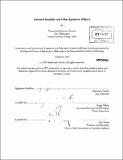| dc.contributor.advisor | Roger White. | en_US |
| dc.contributor.author | Vavova, Ekaterina Dimitrova | en_US |
| dc.contributor.other | Massachusetts Institute of Technology. Dept. of Linguistics and Philosophy. | en_US |
| dc.date.accessioned | 2011-04-25T15:56:06Z | |
| dc.date.available | 2011-04-25T15:56:06Z | |
| dc.date.copyright | 2010 | en_US |
| dc.date.issued | 2010 | en_US |
| dc.identifier.uri | http://hdl.handle.net/1721.1/62421 | |
| dc.description | Thesis (Ph. D.)--Massachusetts Institute of Technology, Dept. of Linguistics and Philosophy, 2010. | en_US |
| dc.description | Cataloged from PDF version of thesis. | en_US |
| dc.description | Includes bibliographical references (p. 81-84). | en_US |
| dc.description.abstract | I consider three ways in which our epistemic situation might be more impoverished than we ordinarily take it to be. I argue that we can save our robust epistemic lives from the skeptic. But only if we accept that they aren't quite as robust as we thought. In Chapter One, I ask whether the discovery that your belief has been influenced by your background should worry you. I provide a principled way of distinguishing between the kind of influence that is evidence of our own error, and the kind that is not. I argue, contra the dogmatist, that appropriate humility requires us to reduce confidence in response to the former. I conclude by explaining the nature and import of such humility: what it is, what accommodating it rationally amounts to, and why it need not entail skepticism. In Chapter Two, I ask whether awareness of disagreement calls for a similar sort of humility. Many of those who think it does make a plausible exception for propositions in which we are rationally highly confident. I show that, on the contrary, rational high confidence can make disagreement especially significant. This is because the significance of disagreement is largely shaped by our antecedent expectations, and we should not expect disagreement about propositions in which high confidence is appropriate. In Chapter Three, I consider whether a deflated theory of knowledge can help negotiate the path between skepticism and dogmatism more generally. I argue that knowing some proposition does not automatically entitle you to reason with it. The good news is that, on this view, we know a lot. The bad news is that most of what we know is junk: we cannot reason with it to gain more knowledge. It thus cannot play many of the roles that we typically want knowledge to play. | en_US |
| dc.description.statementofresponsibility | by Ekaterina Dimitrova Vavova. | en_US |
| dc.format.extent | 84 p. | en_US |
| dc.language.iso | eng | en_US |
| dc.publisher | Massachusetts Institute of Technology | en_US |
| dc.rights | M.I.T. theses are protected by
copyright. They may be viewed from this source for any purpose, but
reproduction or distribution in any format is prohibited without written
permission. See provided URL for inquiries about permission. | en_US |
| dc.rights.uri | http://dspace.mit.edu/handle/1721.1/7582 | en_US |
| dc.subject | Linguistics and Philosophy. | en_US |
| dc.title | Rational humility and other epistemic killjoys | en_US |
| dc.type | Thesis | en_US |
| dc.description.degree | Ph.D. | en_US |
| dc.contributor.department | Massachusetts Institute of Technology. Department of Linguistics and Philosophy | |
| dc.identifier.oclc | 710986677 | en_US |
